Resume
Home Health Nurse Cover Letter Examples

May 29, 2025
|
12 min read
Crafting a standout home health nurse cover letter: Infuse your application with the perfect dose of compassion and professionalism. Learn how to nurture your words and make your dedication to patient care shine.
4.70 Average rating
Rated by 348 people
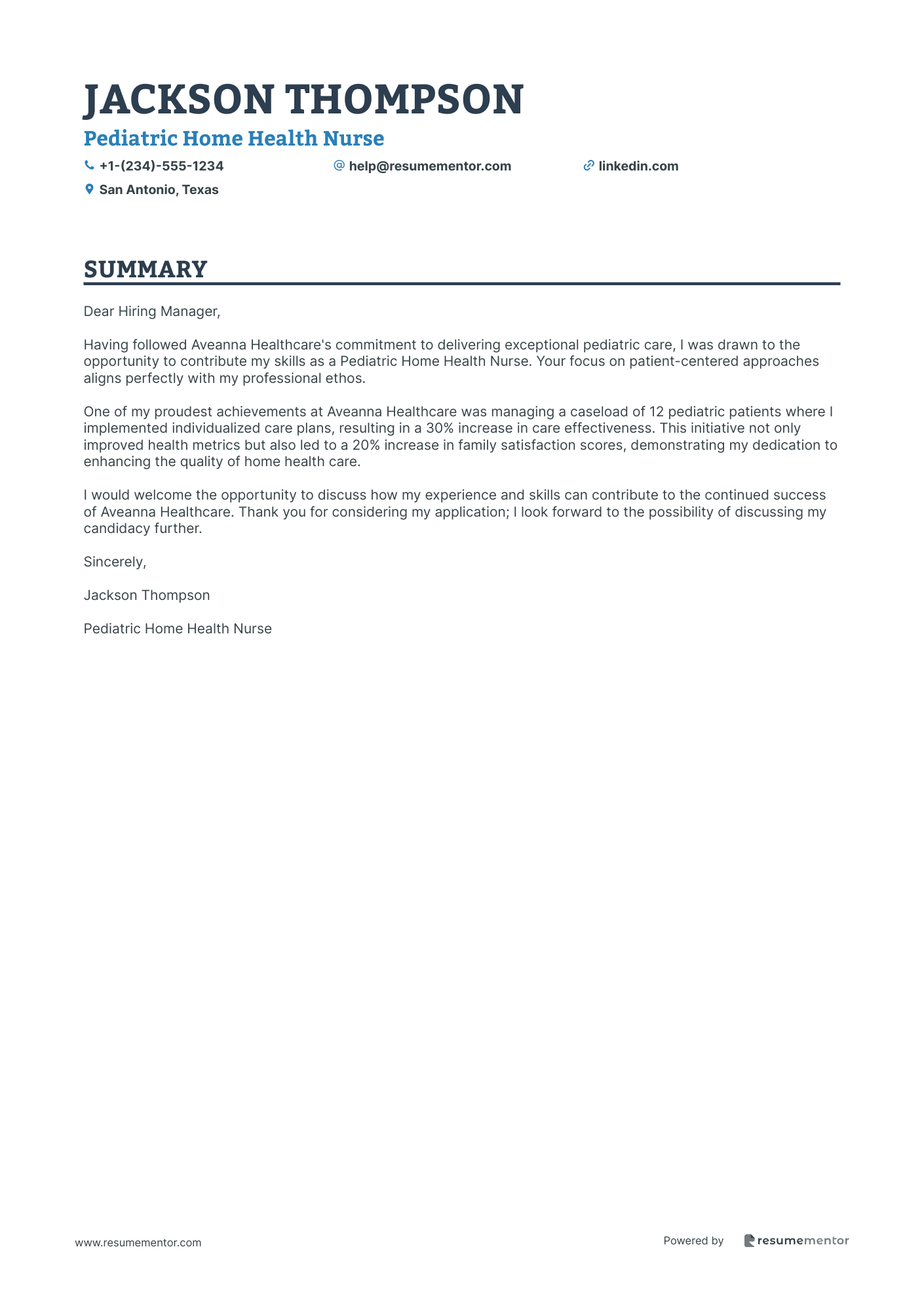
Pediatric Home Health Nurse
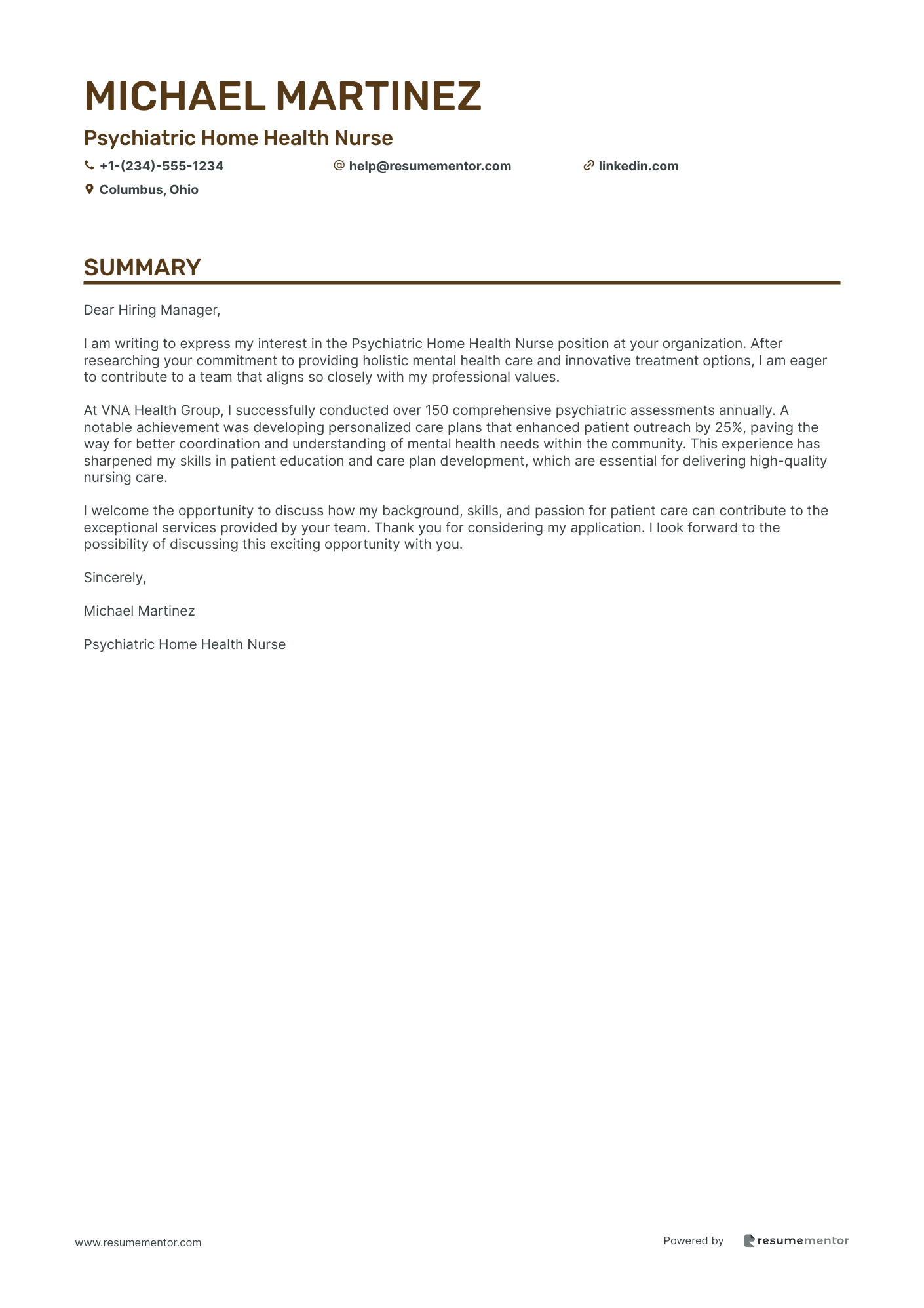
Psychiatric Home Health Nurse
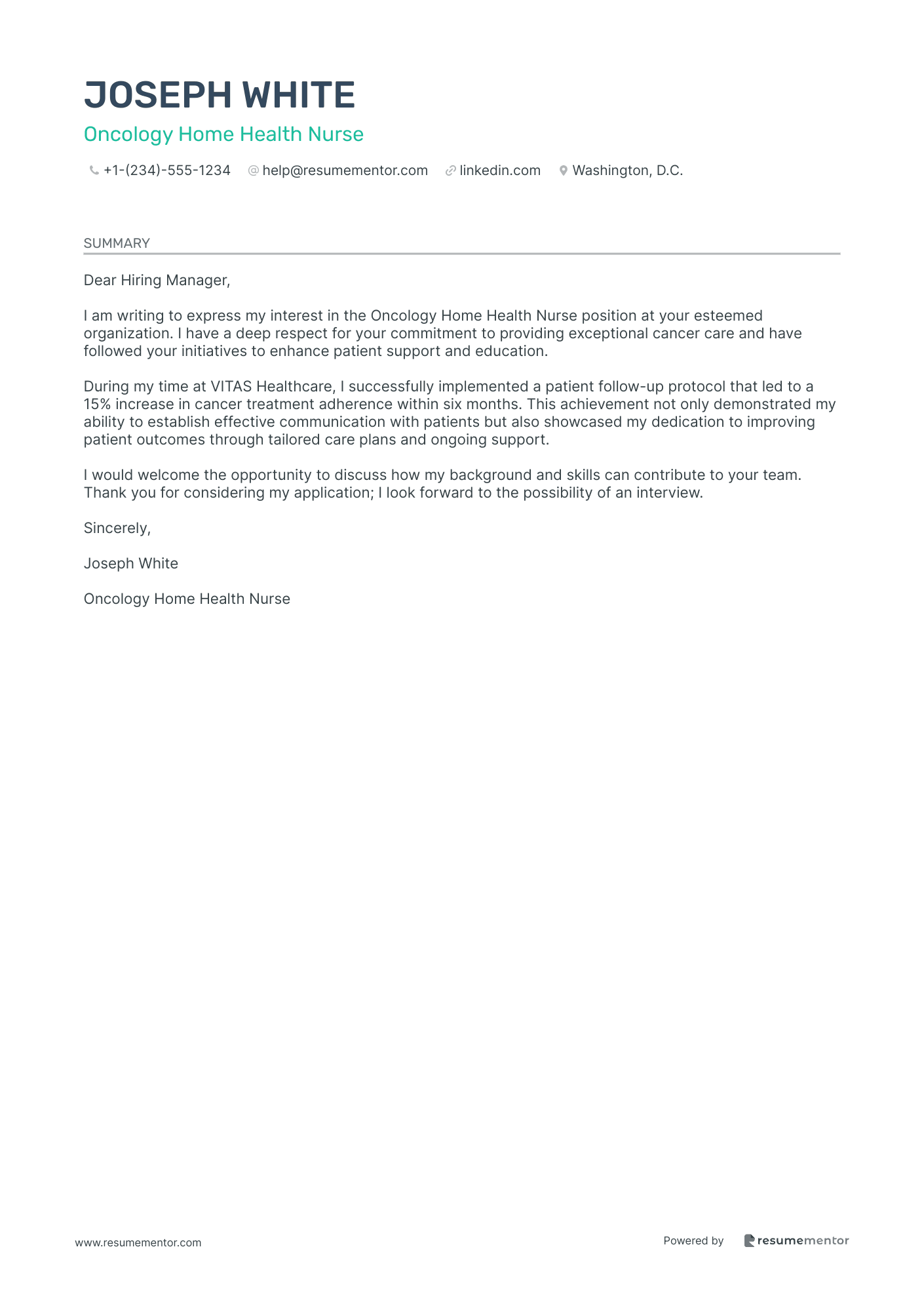
Oncology Home Health Nurse
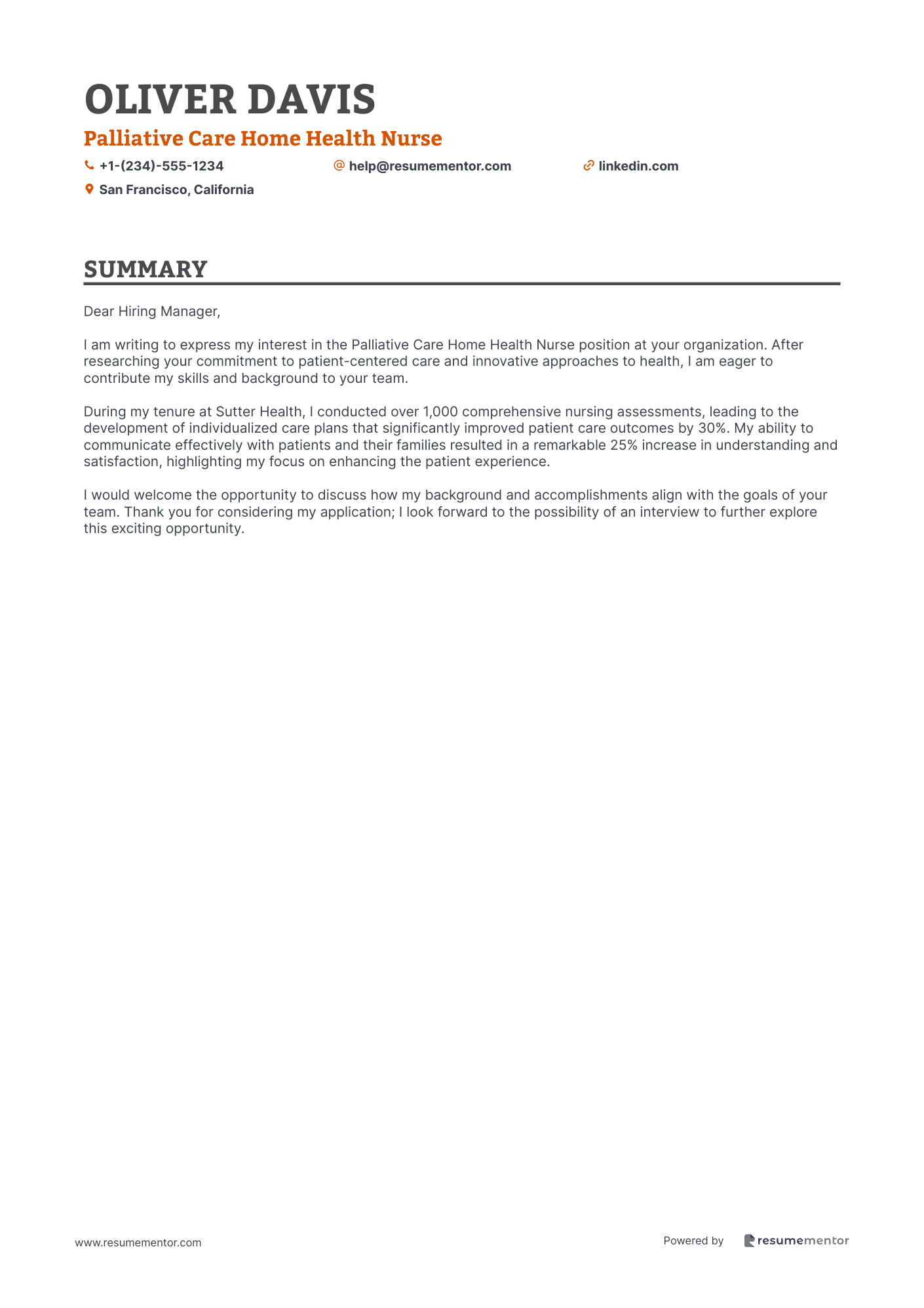
Palliative Care Home Health Nurse
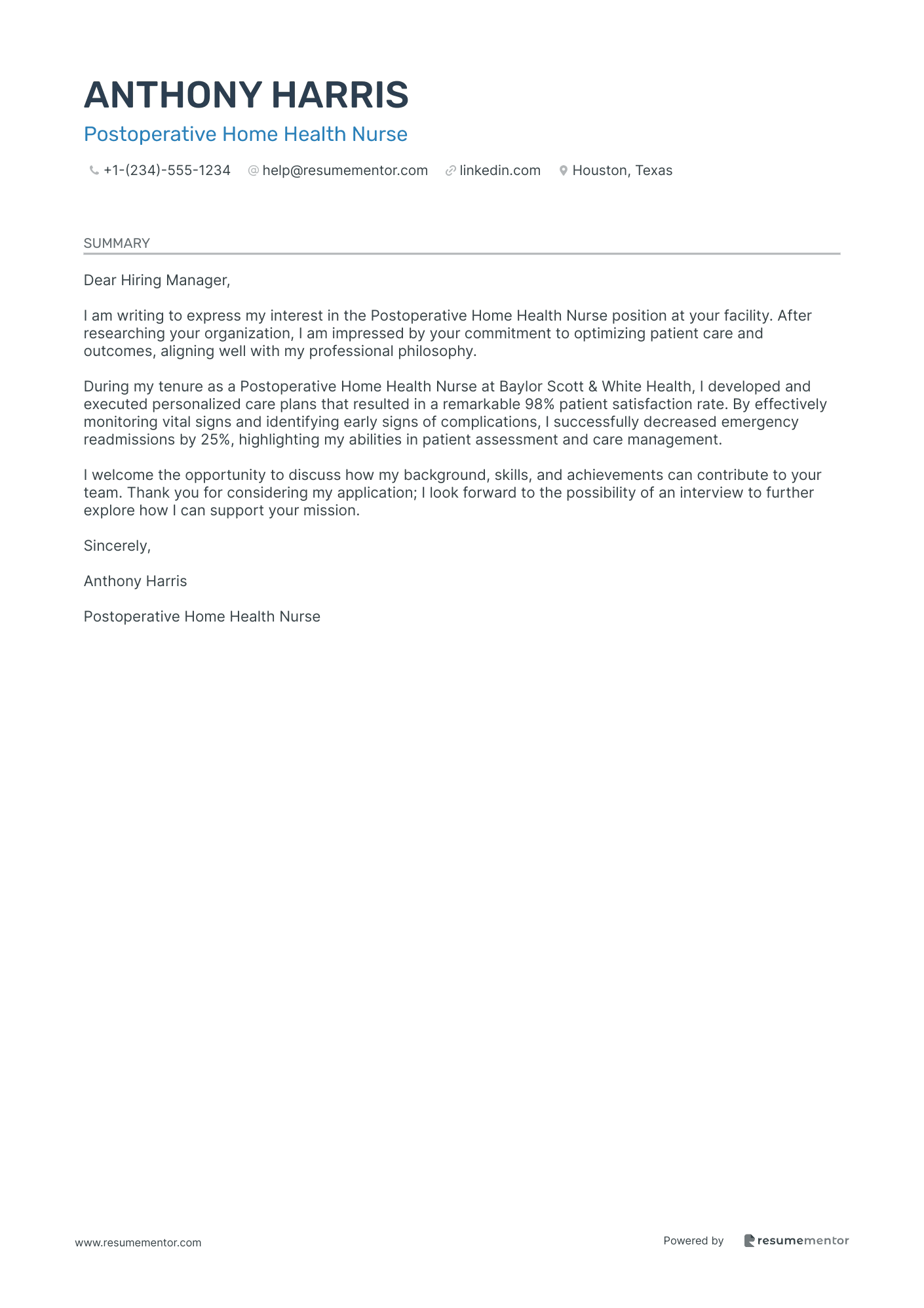
Postoperative Home Health Nurse
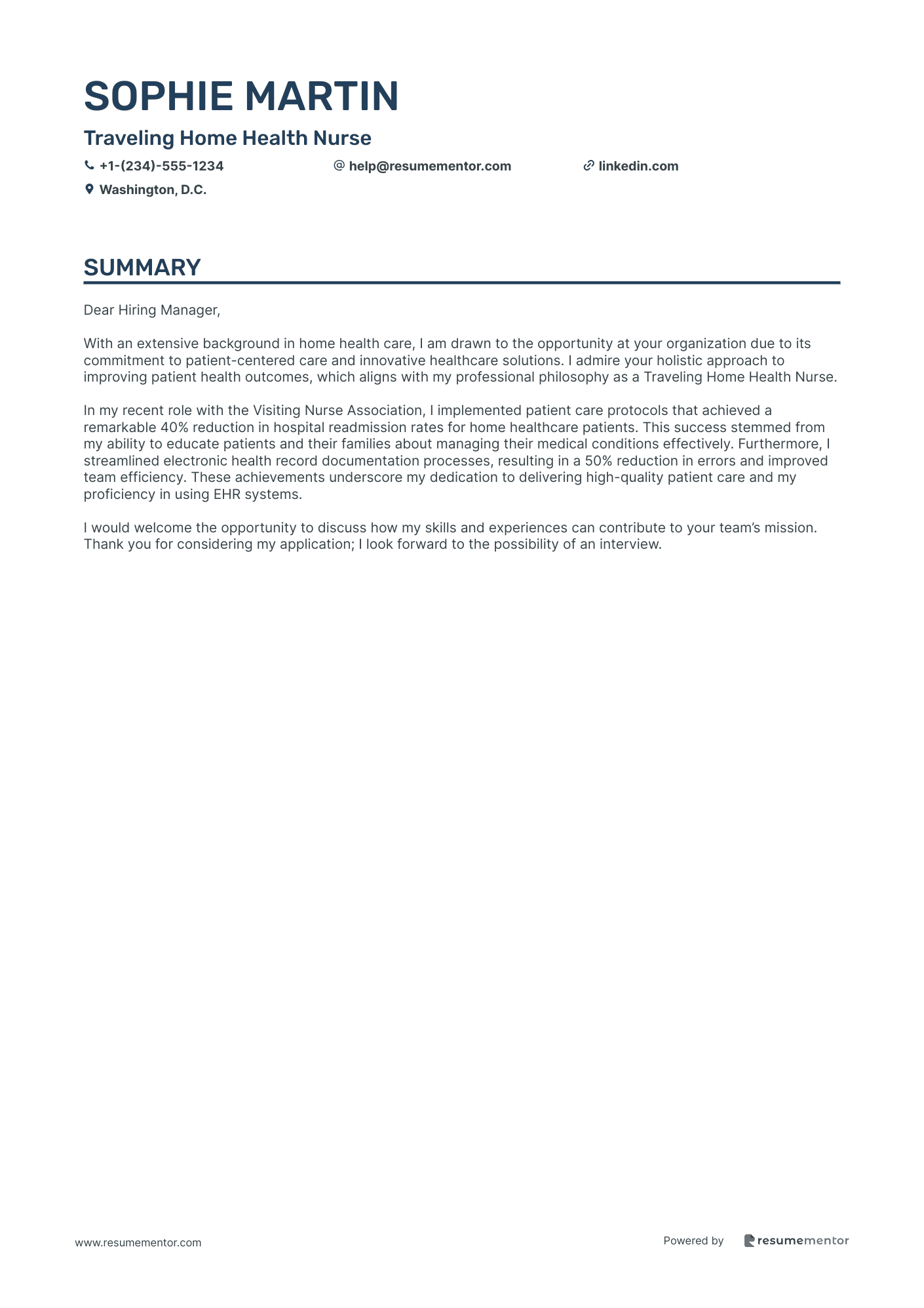
Traveling Home Health Nurse
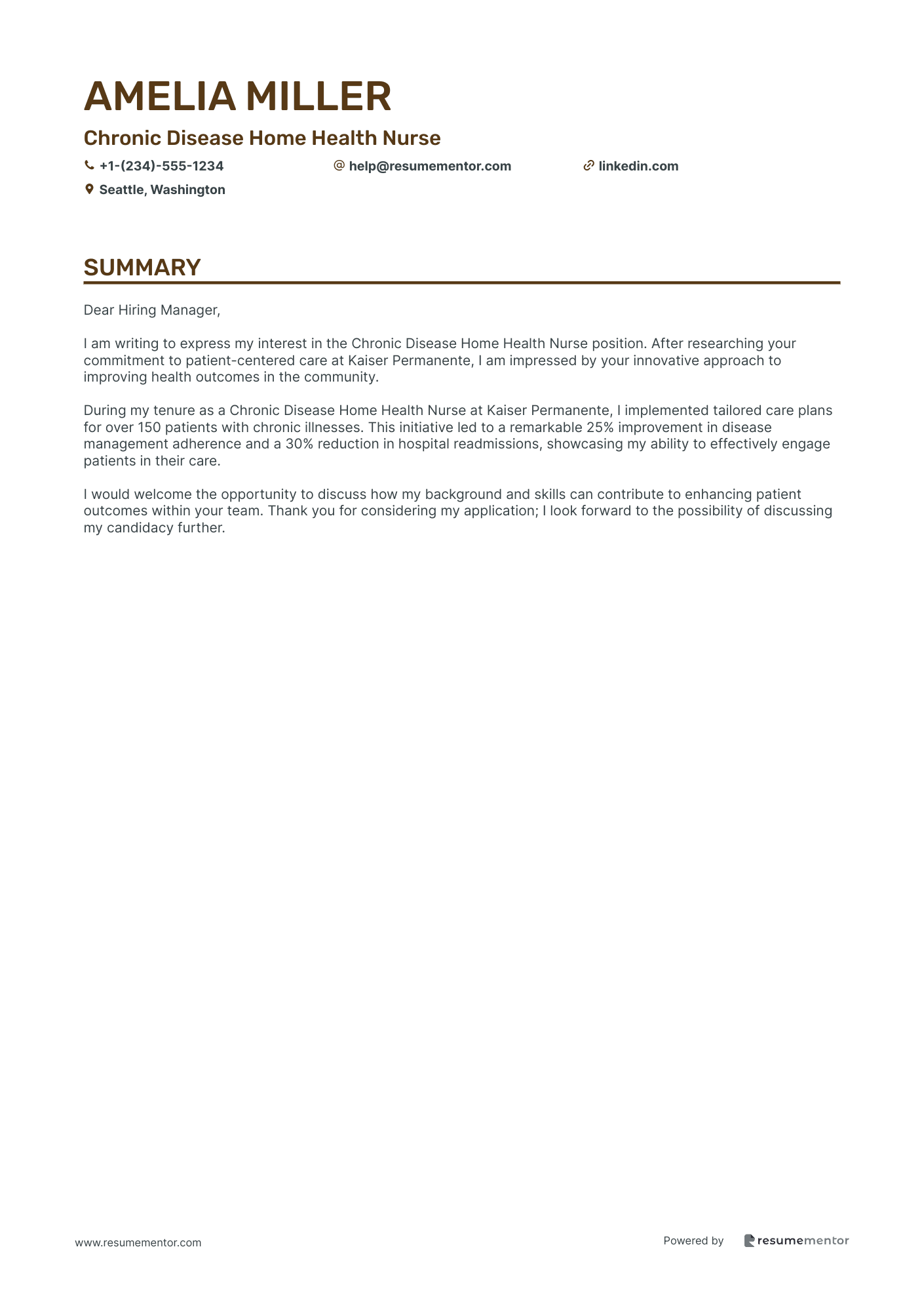
Chronic Disease Home Health Nurse
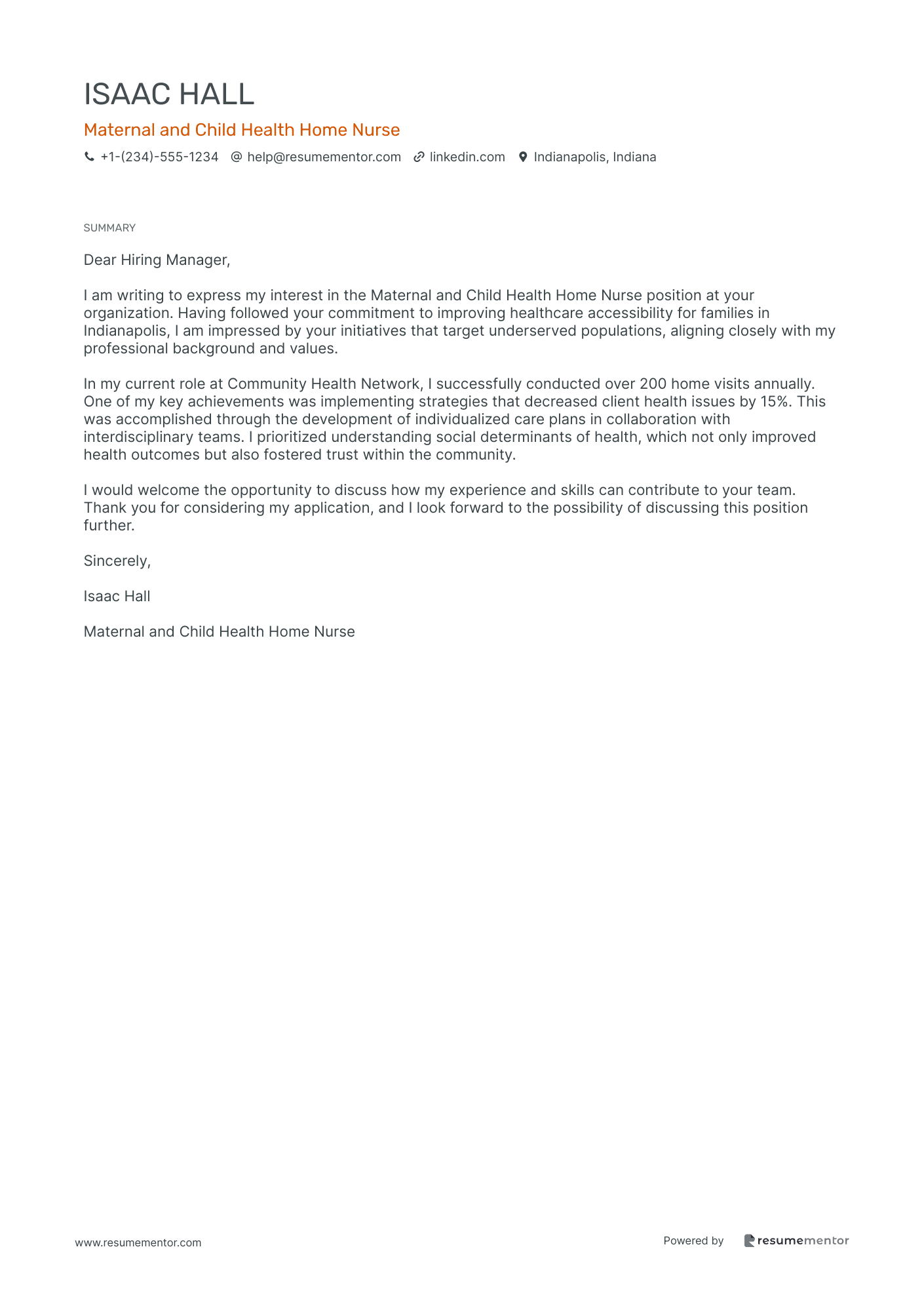
Maternal and Child Health Home Nurse
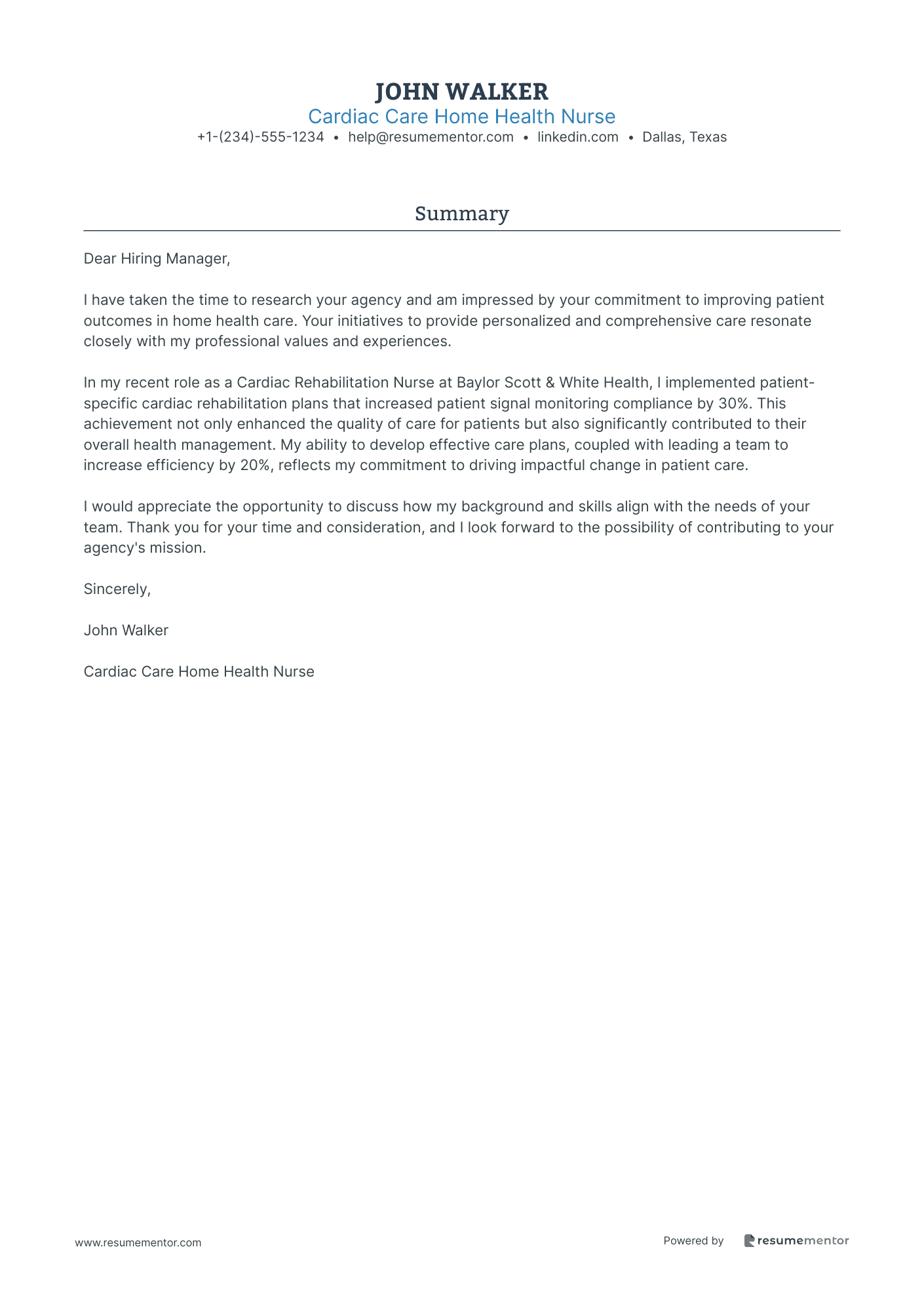
Cardiac Care Home Health Nurse
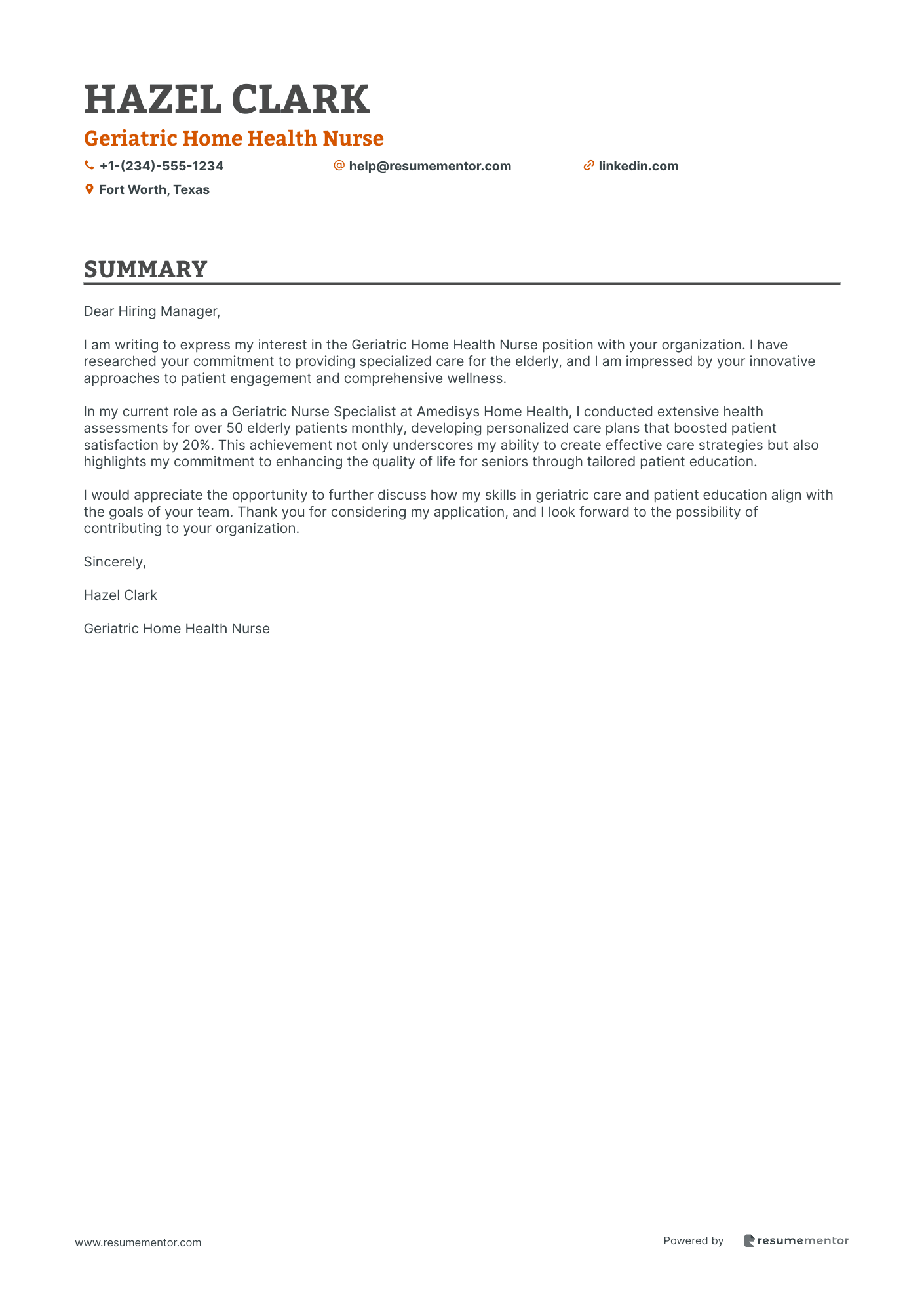
Geriatric Home Health Nurse

Pediatric Home Health Nurse cover letter sample
When applying for this position, it's essential to showcase any relevant clinical experience, especially with children or in home health settings. Highlight your skills in patient assessment, medication management, and care planning. Certifications, such as Pediatric Advanced Life Support (PALS), should be mentioned to demonstrate specialized training. Use examples of how your compassionate care improved patient outcomes or family satisfaction. Share experiences where your attention to detail and effective communication with families enhanced care plans, using a 'skill-action-result' framework to illustrate your impact.
Jackson Thompson
Pediatric Home Health Nurse
Summary
Dear Hiring Manager,
Having followed Aveanna Healthcare's commitment to delivering exceptional pediatric care, I was drawn to the opportunity to contribute my skills as a Pediatric Home Health Nurse. Your focus on patient-centered approaches aligns perfectly with my professional ethos.
One of my proudest achievements at Aveanna Healthcare was managing a caseload of 12 pediatric patients where I implemented individualized care plans, resulting in a 30% increase in care effectiveness. This initiative not only improved health metrics but also led to a 20% increase in family satisfaction scores, demonstrating my dedication to enhancing the quality of home health care.
I would welcome the opportunity to discuss how my experience and skills can contribute to the continued success of Aveanna Healthcare. Thank you for considering my application; I look forward to the possibility of discussing my candidacy further.
Sincerely,
Jackson Thompson
Pediatric Home Health Nurse
Psychiatric Home Health Nurse cover letter sample
When writing your cover letter, emphasize your clinical experience in mental health settings. Highlight any certifications in mental health nursing or relevant training programs you have completed. Showcase your ability to build rapport with patients and their families, which is crucial for successful treatment. Provide specific examples of how your interventions have improved patient outcomes, using a 'skill-action-result' format. Mention your strengths in crisis intervention and care coordination, as these are essential skills that can greatly benefit patient care in home health settings.
Michael Martinez
Psychiatric Home Health Nurse
Summary
Dear Hiring Manager,
I am writing to express my interest in the Psychiatric Home Health Nurse position at your organization. After researching your commitment to providing holistic mental health care and innovative treatment options, I am eager to contribute to a team that aligns so closely with my professional values.
At VNA Health Group, I successfully conducted over 150 comprehensive psychiatric assessments annually. A notable achievement was developing personalized care plans that enhanced patient outreach by 25%, paving the way for better coordination and understanding of mental health needs within the community. This experience has sharpened my skills in patient education and care plan development, which are essential for delivering high-quality nursing care.
I welcome the opportunity to discuss how my background, skills, and passion for patient care can contribute to the exceptional services provided by your team. Thank you for considering my application. I look forward to the possibility of discussing this exciting opportunity with you.
Sincerely,
Michael Martinez
Psychiatric Home Health Nurse
Oncology Home Health Nurse cover letter sample
When applying for this role, it’s essential to highlight your clinical experience and knowledge of oncology care. Emphasize any certifications in chemotherapy administration or palliative care, as these reflect your expertise. Discuss your ability to manage patient education and emotional support, demonstrating your skills in communication and empathy. Include specific examples of how you improved patient outcomes or streamlined processes in previous roles. Use a 'skill-action-result' framework to show how your contributions positively impacted patient satisfaction and care quality.
Joseph White
Oncology Home Health Nurse
Summary
Dear Hiring Manager,
I am writing to express my interest in the Oncology Home Health Nurse position at your esteemed organization. I have a deep respect for your commitment to providing exceptional cancer care and have followed your initiatives to enhance patient support and education.
During my time at VITAS Healthcare, I successfully implemented a patient follow-up protocol that led to a 15% increase in cancer treatment adherence within six months. This achievement not only demonstrated my ability to establish effective communication with patients but also showcased my dedication to improving patient outcomes through tailored care plans and ongoing support.
I would welcome the opportunity to discuss how my background and skills can contribute to your team. Thank you for considering my application; I look forward to the possibility of an interview.
Sincerely,
Joseph White
Oncology Home Health Nurse
Palliative Care Home Health Nurse cover letter sample
When applying for this role, it's essential to highlight your experience in providing compassionate care for patients with serious illnesses. Detail your ability to work collaboratively with interdisciplinary teams to develop care plans that prioritize comfort and quality of life. Mention any specialized training in pain management or symptom control. Include examples of how you have effectively communicated with patients and their families to address concerns and provide education. Show how your empathetic approach has positively impacted patient outcomes and satisfaction.
Oliver Davis
Palliative Care Home Health Nurse
Summary
Dear Hiring Manager,
I am writing to express my interest in the Palliative Care Home Health Nurse position at your organization. After researching your commitment to patient-centered care and innovative approaches to health, I am eager to contribute my skills and background to your team.
During my tenure at Sutter Health, I conducted over 1,000 comprehensive nursing assessments, leading to the development of individualized care plans that significantly improved patient care outcomes by 30%. My ability to communicate effectively with patients and their families resulted in a remarkable 25% increase in understanding and satisfaction, highlighting my focus on enhancing the patient experience.
I would welcome the opportunity to discuss how my background and accomplishments align with the goals of your team. Thank you for considering my application; I look forward to the possibility of an interview to further explore this exciting opportunity.
Postoperative Home Health Nurse cover letter sample
When applying for this role, it is important to emphasize any experience in patient care and wound management. Highlight your ability to monitor vital signs and manage medications effectively. Listing certifications, such as Basic Life Support (BLS) or Advanced Cardiac Life Support (ACLS), can strengthen your application. Be sure to include specific instances where you've improved patient recovery or satisfaction, using a 'skill-action-result' format to demonstrate the impact of your contributions in previous positions. This approach will set your application apart.
Anthony Harris
Postoperative Home Health Nurse
Summary
Dear Hiring Manager,
I am writing to express my interest in the Postoperative Home Health Nurse position at your facility. After researching your organization, I am impressed by your commitment to optimizing patient care and outcomes, aligning well with my professional philosophy.
During my tenure as a Postoperative Home Health Nurse at Baylor Scott & White Health, I developed and executed personalized care plans that resulted in a remarkable 98% patient satisfaction rate. By effectively monitoring vital signs and identifying early signs of complications, I successfully decreased emergency readmissions by 25%, highlighting my abilities in patient assessment and care management.
I welcome the opportunity to discuss how my background, skills, and achievements can contribute to your team. Thank you for considering my application; I look forward to the possibility of an interview to further explore how I can support your mission.
Sincerely,
Anthony Harris
Postoperative Home Health Nurse
Traveling Home Health Nurse cover letter sample
Highlight your nursing qualifications, including your registered nursing license and any specialized training in home health care. Emphasize your ability to provide compassionate patient care, manage diverse medical needs, and adapt to different environments. If you have experience with electronic health records or patient management software, mention it. Include examples where your clinical skills improved patient outcomes or led to greater patient satisfaction. Lastly, demonstrate your flexibility and reliability, as these traits are essential for delivering care in various settings that may require travel.
Sophie Martin
Traveling Home Health Nurse
Summary
Dear Hiring Manager,
With an extensive background in home health care, I am drawn to the opportunity at your organization due to its commitment to patient-centered care and innovative healthcare solutions. I admire your holistic approach to improving patient health outcomes, which aligns with my professional philosophy as a Traveling Home Health Nurse.
In my recent role with the Visiting Nurse Association, I implemented patient care protocols that achieved a remarkable 40% reduction in hospital readmission rates for home healthcare patients. This success stemmed from my ability to educate patients and their families about managing their medical conditions effectively. Furthermore, I streamlined electronic health record documentation processes, resulting in a 50% reduction in errors and improved team efficiency. These achievements underscore my dedication to delivering high-quality patient care and my proficiency in using EHR systems.
I would welcome the opportunity to discuss how my skills and experiences can contribute to your team’s mission. Thank you for considering my application; I look forward to the possibility of an interview.
Chronic Disease Home Health Nurse cover letter sample
In your cover letter, emphasize any relevant clinical experience, especially in managing chronic conditions. Highlight your strong assessment skills and ability to create personalized care plans. Mention any certifications in chronic disease management or home health care that demonstrate your commitment to ongoing learning. Provide specific examples of how your interventions improved patient outcomes or enhanced quality of life. Use a 'skill-action-result' framework to illustrate how your actions have directly benefited patients, showcasing your impact and dedication to their well-being.
Amelia Miller
Chronic Disease Home Health Nurse
Summary
Dear Hiring Manager,
I am writing to express my interest in the Chronic Disease Home Health Nurse position. After researching your commitment to patient-centered care at Kaiser Permanente, I am impressed by your innovative approach to improving health outcomes in the community.
During my tenure as a Chronic Disease Home Health Nurse at Kaiser Permanente, I implemented tailored care plans for over 150 patients with chronic illnesses. This initiative led to a remarkable 25% improvement in disease management adherence and a 30% reduction in hospital readmissions, showcasing my ability to effectively engage patients in their care.
I would welcome the opportunity to discuss how my background and skills can contribute to enhancing patient outcomes within your team. Thank you for considering my application; I look forward to the possibility of discussing my candidacy further.
Maternal and Child Health Home Nurse cover letter sample
When applying for this role, it’s essential to highlight any experience in maternal and child health. Emphasize your clinical skills in assessments, education, and support for families. Mention certifications like CPR or first aid to show your readiness for emergencies. Include specific examples of how you've positively influenced outcomes, such as improved breastfeeding rates or enhanced parental confidence. Use the 'skill-action-result' format to outline how your efforts led to better health metrics or increased satisfaction among families you’ve worked with.
Isaac Hall
Maternal and Child Health Home Nurse
Summary
Dear Hiring Manager,
I am writing to express my interest in the Maternal and Child Health Home Nurse position at your organization. Having followed your commitment to improving healthcare accessibility for families in Indianapolis, I am impressed by your initiatives that target underserved populations, aligning closely with my professional background and values.
In my current role at Community Health Network, I successfully conducted over 200 home visits annually. One of my key achievements was implementing strategies that decreased client health issues by 15%. This was accomplished through the development of individualized care plans in collaboration with interdisciplinary teams. I prioritized understanding social determinants of health, which not only improved health outcomes but also fostered trust within the community.
I would welcome the opportunity to discuss how my experience and skills can contribute to your team. Thank you for considering my application, and I look forward to the possibility of discussing this position further.
Sincerely,
Isaac Hall
Maternal and Child Health Home Nurse
Cardiac Care Home Health Nurse cover letter sample
When applying for this role, it’s essential to showcase any prior experience in home health or cardiac care. Highlight your skills in patient assessment, medication management, and education on heart health. If you've earned certifications like BLS or CPR, include them to demonstrate your preparedness. Share specific instances where your interventions improved patient outcomes or satisfaction. Use the 'skill-action-result' format to illustrate how your expertise has positively impacted patients' lives, showcasing your ability to deliver high-quality care consistently.
John Walker
Cardiac Care Home Health Nurse
Summary
Dear Hiring Manager,
I have taken the time to research your agency and am impressed by your commitment to improving patient outcomes in home health care. Your initiatives to provide personalized and comprehensive care resonate closely with my professional values and experiences.
In my recent role as a Cardiac Rehabilitation Nurse at Baylor Scott & White Health, I implemented patient-specific cardiac rehabilitation plans that increased patient signal monitoring compliance by 30%. This achievement not only enhanced the quality of care for patients but also significantly contributed to their overall health management. My ability to develop effective care plans, coupled with leading a team to increase efficiency by 20%, reflects my commitment to driving impactful change in patient care.
I would appreciate the opportunity to discuss how my background and skills align with the needs of your team. Thank you for your time and consideration, and I look forward to the possibility of contributing to your agency's mission.
Sincerely,
John Walker
Cardiac Care Home Health Nurse
Geriatric Home Health Nurse cover letter sample
In your cover letter, it's important to highlight any prior experience in geriatric care or home health settings. Mention your ability to manage medications and monitor vital signs, as these are crucial tasks. Showcase your interpersonal skills, as building trust with patients and their families is essential. Include any certifications such as CPR or first aid, and specify relevant training in geriatric care practices. Lastly, use specific examples of how your compassionate approach has improved patient comfort or recovery, following a 'skill-action-result' structure.
Hazel Clark
Geriatric Home Health Nurse
Summary
Dear Hiring Manager,
I am writing to express my interest in the Geriatric Home Health Nurse position with your organization. I have researched your commitment to providing specialized care for the elderly, and I am impressed by your innovative approaches to patient engagement and comprehensive wellness.
In my current role as a Geriatric Nurse Specialist at Amedisys Home Health, I conducted extensive health assessments for over 50 elderly patients monthly, developing personalized care plans that boosted patient satisfaction by 20%. This achievement not only underscores my ability to create effective care strategies but also highlights my commitment to enhancing the quality of life for seniors through tailored patient education.
I would appreciate the opportunity to further discuss how my skills in geriatric care and patient education align with the goals of your team. Thank you for considering my application, and I look forward to the possibility of contributing to your organization.
Sincerely,
Hazel Clark
Geriatric Home Health Nurse
Related Articles

Continue Reading
Check more recommended readings to get the job of your dreams.
Resume
Resources
Tools
© 2026. All rights reserved.
Made with love by people who care.
